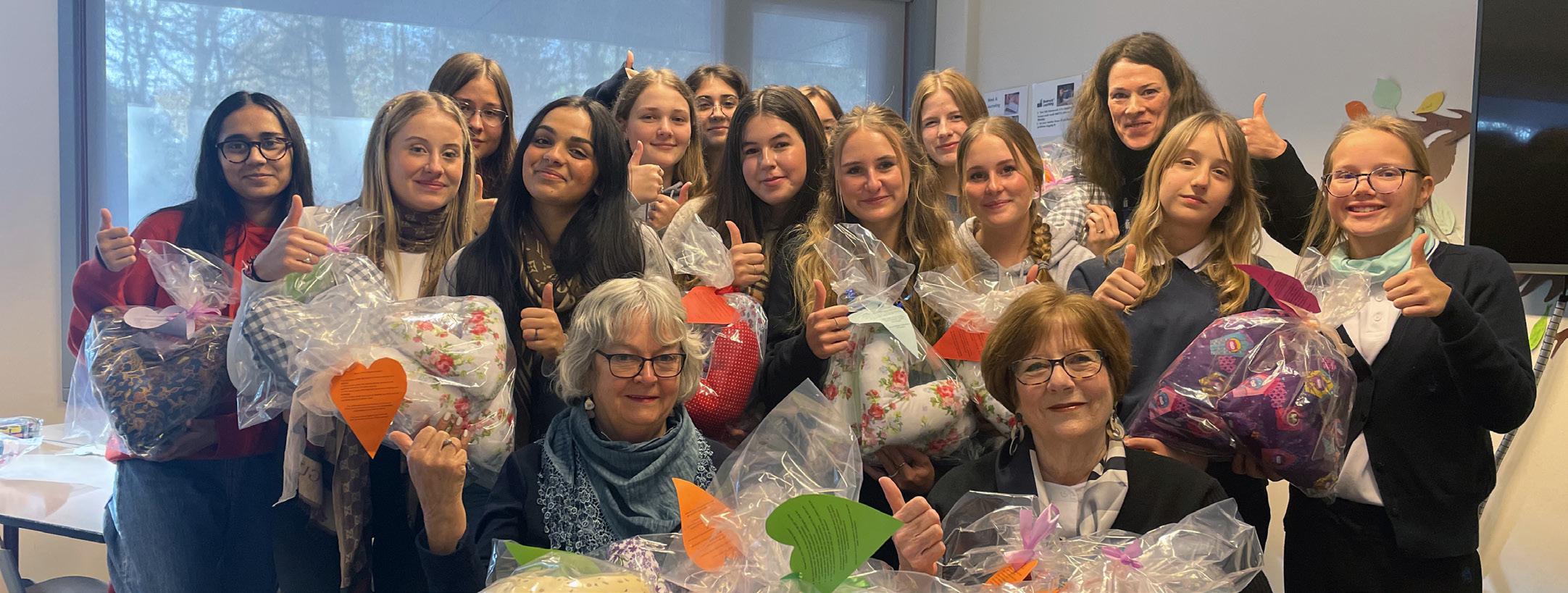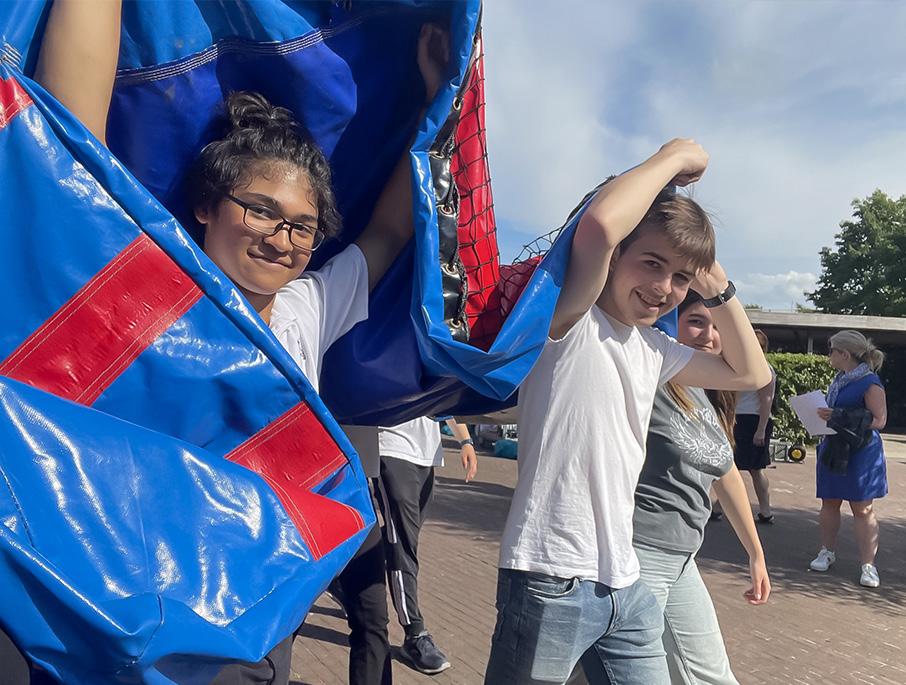WHAT IS CAS?
The International Baccalaureate aims to develop balanced, well-rounded, individuals who are internationally minded people that will become active, compassionate, and lifelong learners who understand that other people, with their differences, can also be right.
CAS is found at the heart of the Diploma Programme. Together with the Extended Essay and Theory of Knowledge, CAS makes up the Diploma Core. Evidence of your CAS journey is a requirement to pass the IB Diploma Programme.
CAS is a medium for personal and social development, a journey of self-discovery, and an opportunity to learn and explore outside of the classroom. Students are required to undertake a series of experiences based in Creativity, Activity and Service and reflect upon their personal growth during this journey.
The emphasis of CAS is to learn by doing real tasks, that have real consequences, and reflecting on these experiences. The purpose is for students to be involved in experiences that will make a significant difference to their lives and to the lives of others, as well as challenge themselves to extend existing skills or learn new skills. A well-planned CAS programme is meaningful and enjoyable; a journey of discovery of self and others. For many students, their CAS experiences are profound and life-changing.
You will be responsible for creating your own programme, both instigating and participating in opportunities on a local, national and global scale.
You will reflect purposefully on your engagement with all CAS experiences and will be guided to look for moments of personal significance or inspiration.


BSN
STUDENT EXPECTATIONS
In order to fulfil both the exam board requirements and more importantly, participate in a meaningful and diverse programme, we have an expectation that students will complete a programme which will reflect the following elements.
Regular reflection to demonstrate weekly involvement in CAS
Evidence of meeting the 7 Learning Outcomes
Evidence of 3 Formal Interviews
At least one substantial student organised CAS Project using the IPARD-stages
CAS Plan: setting a personal challenge or goal in line with achieving one of the UN Sustainable Development Goals
All CAS students are encouraged to be involved in at least one extra-curricular activity offered through school
We use a Log-book on OneNote to document the CAS portfolio
Weekly CAS engagement equivalent to 2 -3 hours

THE IB LEARNER PROFILE
The aim of the IB programme is to develop internationally minded people who, recognizing their common humanity and shared guardianship of the planet, help to create a better and more peaceful world. As IB learners, students will develop in the following attributes:
Inquirers
We nurture our curiosity, developing skills for inquiry and research. We know how to learn independently and with others. We learn with enthusiasm and sustain our love of learning throughout life.
Knowledgeable
We develop and use conceptual understanding, exploring knowledge across a range of disciplines. We engage with issues and ideas that have local and global significance.
Thinkers
We use critical and creative thinking skills to analyse and take responsible action on complex problems. We exercise initiative in making reasoned, ethical decisions.
Communicators
We express ourselves confidently and creatively in more than one language and in many ways. We collaborate effectively, listening carefully to the perspectives of other individuals and groups.
Principled
We act with integrity and honesty, with a strong sense of fairness and justice, and with respect for the dignity and rights of people everywhere. We take responsibility for our actions and their consequences.
Open-Minded
We critically appreciate our own cultures and personal histories, as well as the values and traditions of others. We seek and evaluate a range of points of view, and we are willing to grow from the experience.
Caring
We show empathy, compassion and respect. We have a commitment to service, and we act to make a positive difference in the lives of others and in the world around us.
Risk Takers
We approach uncertainty with forethought and determination; we work independently and cooperatively to explore new ideas and innovative strategies. We are resourceful and resilient in the face of challenges and change.
Balanced
We understand the importance of balancing different aspects of our lives—intellectual, physical, and emotional—to achieve wellbeing for ourselves and others. We recognize our interdependence with other people and with the world in which we live.
Reflective
We thoughtfully consider the world and our own ideas and experience. We work to understand our strengths and weaknesses in order to support our learning and personal development.
We believe the IB Learner Profile attributes, along with the BSN character profile, can help individuals and groups become responsible members of local, national and global communities. CAS is an integral part of becoming well rounded, balanced individuals with the tools to succeed in life.

THE CAS STRANDS
Most worthwhile experiences fall into at least two of the CAS Strands. Broadly speaking, you can think of them as new challenges that include the key elements of:
Creativity: any experience that stimulates your creative side
Activity: any experience that requires some form of physical exertion
Service: any experience that is voluntary or unpaid, and helps an individual or group in your school, local or global community, either directly or indirectly
CREATIVITY
‘Creativity’ in CAS allows you to develop your own sense of original thinking and expression. Creativity will come from your talents, interests, passions, emotional responses and imagination. This may include visual and performing arts, digital design, writing, film, crafts or composition. You are encouraged to engage in creative endeavours that move you beyond the familiar, broadening your scope from conventional to unconventional thinking.
ACTIVITY
‘Activity’ in CAS promotes lifelong healthy habits related to physical wellbeing. This includes participation in expeditions, individual and team sports, and physical activities outside the normal curriculum. It may also include physical activity involved in carrying out creative and service projects.
Those who regularly participate in suitable activity experiences are encouraged to develop and extend their participation. You could expand personal goals, explore different training models to enhance your existing sport or become involved in a new sport. For dedicated student athletes, maintenance of a planned rigorous training programme is appropriate. It is important to note that routine activities such as cycling to school do not meet the CAS requirement.
SERVICE
‘Service’ in CAS promotes a meaningful contribution to your community and society. Through service you learn to identify and address authentic community needs.
Service is often seen as one of the most transforming elements of CAS by promoting self-awareness based on real-life situations involving decision-making, problem-solving, initiative, responsibility, and accountability for your actions.
It is recommended that you engage with different types of service within the CAS programme. The four types of service are as follows:
Direct service: Your interaction involves people, the environment or animals. For example, this could be oneon-one tutoring, developing a garden in partnership with refugees, or working in an animal shelter.
Indirect service: Though you do not see the recipients of indirect service, you will verify that your actions will benefit the community or environment. For example, this could be as re-designing a non-profit organization’s website, writing original picture books to teach a language, or nurturing tree seedlings for planting.
Advocacy: This is when you speak on behalf of a cause or concern to promote action on an issue of public interest. For example, this could be initiating an awareness campaign on hunger, performing a play on replacing bullying with respect, or creating a video on sustainable water solutions.
Research: You collect information through varied sources, analyse data, and report on a topic of importance to influence policy or practice. For example, by conducting environmental surveys to influence the school, contribute to a study of animal migration, compile effective means to reduce litter in public spaces, or conduct social research by interviewing people on topics such as homelessness, unemployment or isolation.
MAKE IT CAS MAKE IT BETTER
CAS is about taking your interest, values and developing them whilst having a great impact on your communities. Here is an example of how you can take an interest in cooking and develop it:
Cooking club. My friends and I decided to start a cooking club after school. We come from different countries and plan to cook food to represent our different cultures.
Club becomes international fair at school. Many young students joined our club. They enjoy cooking whilst improving their language skills in Spanish, Italian, Arabic and French. We have decided to arrange a food fair at school.
Recipe book developed and sold for fundraiser. The international food fair was a success. We decided to document the recipes and sell a recipe book to raise money. The money raised will go towards our local food bank, where many CAS students volunteer.
Learning through reflection. Throughout the experience students identified significant moments to reflect on their learning. Whilst the experience grew, it taught students to develop their personal skills and grow as individuals.

THE LEARNING OUTCOMES
LO 1. Identify own strengths and develop areas for growth
Students are able to see themselves as individuals with various abilities and skills, of which some are more developed than others.
LO 2. Demonstrate that challenges have been undertaken, developing new skills in the process
A new challenge may be an unfamiliar experience or an extension of an existing one. The newly acquired or developed skills may be shown through experiences that the student has not previously undertaken or through increased expertise in an established area.
LO 3. Demonstrate how to initiate and plan a CAS experience
Students can articulate the stages from conceiving an idea to executing a plan for a CAS experience or series of CAS experiences. This may be accomplished in collaboration with other participants. Students may show their knowledge and awareness by building on a previous experience, or by launching a new idea or process.
Students are able to identify, demonstrate and critically discuss the benefits and challenges of collaboration gained through CAS experiences.
LO
Demonstrate engagement with issues of global significance
Students are able to identify and demonstrate their understanding of global issues, make responsible decisions, and take appropriate action in response to the issue either locally, nationally or internationally.
LO 7. Recognize and consider the ethics of choices and actions
Students show awareness of the consequences of choices and actions in planning and carrying out CAS experiences.

WHAT IS CONSIDERED CAS?
WHAT IS CAS?
Does it pursue a personal interest, skill, or talent?
Is it a new challenge?
Does it develop attributes based on IB learner profile?
Will it help achieve the CAS learning outcomes?
Will you, others or the environment benefit?
Does it have links to TOK, EE, or the subjects you are studying?
Does the experience fit into the strands of creativity, activity and service?
Does the experience give you a chance to learn or develop skills and interests?
Sorry,
this cannot be a CAS experience
WHAT IS NOT CAS?
Generally, CAS is not taking place when a student is in a passive role. There should be some form of INTERACTION, whether it is direct or indirect.
Continuation of existing activities without new roles or setting new goals
An experience that is part of the curriculum requirements e.g. an IA or class assignment/homework
Learning to drive, including taking your theory and practical driving tests
Any task with a pre-agreed reward, financial or other benefitin-kind
A passive pursuit, such as a visit to a museum, theatre, art exhibition, concert or sports event, unless it clearly inspires work in a related activity in which a student is already engaged
All forms of duty within the family
Religious devotion and any activity which can be interpreted as proselytizing
Activities which causes division amongst different groups in the community
Doing simple, tedious and repetitive work, like returning school library books to the shelves or handing out drinks at gatherings/events
This looks like the start of a great CAS experience
Does the experience give you a chance to develop qualities of the IB learner profile?
Does the experience sit outside the formal requirements of your subject?
THE CAS PROJECT
CAS PROJECTS AND THE CAS STAGES
The CAS Project is often the highlight of your CAS programme. Before starting your CAS project, make sure you’ve had your CAS Project approved by your CAS Coordinator. Students must carry out at least one CAS Project, but we recommend you limit CAS Projects to a maximum of three so that you can prioritise your academic studies too.
CAS Projects must include the following:
Clear use of CAS IPARD-Stages
Collaborative element, including the school community or community outside school
Minimum of 1 month duration
Be student-initiated. Participating in an experience does not qualify as a project, for example, THIMUN does not count as a project.
Be of a challenge suitable for an IB DP student - can form part of your personal goal

At the end of the CAS Project, you will be required to complete a Project Review as a group - please upload this to ManageBac. You also need to include evidence of using the IPARD stages by using the terms Investigation, Preparation, Action, Reflection, and Demonstration.
Funding may be available, either to temporarily provide you with start-up capital to initiate your project or subsidize it if there is a significant school or local community benefit.
To apply, please discuss this with your CAS co-ordinator, outlining the details of your project, impact, and funding required.
CAS IPARD - Stages
REFLECTIONS IN CAS
Reflection is central to building a deep and rich experience of CAS. Students explore their own actions and reflect on their personal growth.
The emphasis in CAS is on effective reflection, characterised by reflecting on attitudes, feelings, values, principles, motivation, emotions and self-development. Students will be encouraged to informally reflect on their CAS experiences throughout the CAS programme, but are required to reflect formally when developing a CAS portfolio.
Reflections form the only element we can use to show completion of CAS so you need to keep on top of them
Your CAS portfolio will need to be updated at least every two weeks and demonstrate the following:
Evidence of weekly involvement in CAS (photos, videos, emails, plans, schedules) - you don’t need to reflect for every CAS experience every week but they should be regular and ongoing - reflection is a part of the cycle of learning and improvement
Use the Reflection Booklet to guide you in writing meaningful and deep reflections
Ensured that you focus on meeting the CAS Learning Outcomes
Showed your personal development using the IB learner profile
Links to TOK in your reflections

CAS HEALTH CHECK
The CAS Health Check is carried out by the CAS Coordinator and checks the following:
Progress with weekly CAS engagement across the three strands
Developing depth of experiences so they have more impact
Completion of Learning Outcomes through reflection and use of the CAS IPARD stages
Progress with the CAS portfolio
The progress with a Health Check is what determines the flag on ManageBac.
THE CAS TEAM
The CAS team is there to help you ensure that you achieve your full potential in CAS, both in terms of personal development and community impact.
CAS SUPERVISORS
A CAS supervisor leads an organised, timetabled CAS activity in school or out of school. Their role is to:
Inspire you
Structure your learning process
Assess the risks involved in some activities
Teach you skills in their area of expertise
Supervisors can also advise you on how to create a CAS project from a simple CAS experience
Not all CAS experiences need supervisors if they are self-led or student led. If the experience is led by a teacher, or outside organisation, you do need to add their contact details to the CAS experience proposal on ManageBac so we can contact them in case of an emergency, or to verify you have successfully completed your CAS experience.
CAS Supervisor review forms are completed through the supervisor review option via ManageBac once you have completed an experience.
CAS ADVISORS (your form tutor)
Conduct five CAS Reviews (one per term)
Support you with any CAS related questions
Liaise with CAS Coordinator regarding the CAS Review
CAS COORDINATOR (Mrs. Wilson)
Ensures the requirements of the IB are being fulfilled by all students
Oversees the programme and review development
Ensure consistency across tutors and application of flags
Seeks out CAS experiences and partner organisations
Follows up with students failing to fulfil their potential with CAS
Ultimately responsible for the programme
For any CAS related questions, please contact your CAS Coordinator via jolundi.wilson@britishschool.nl

